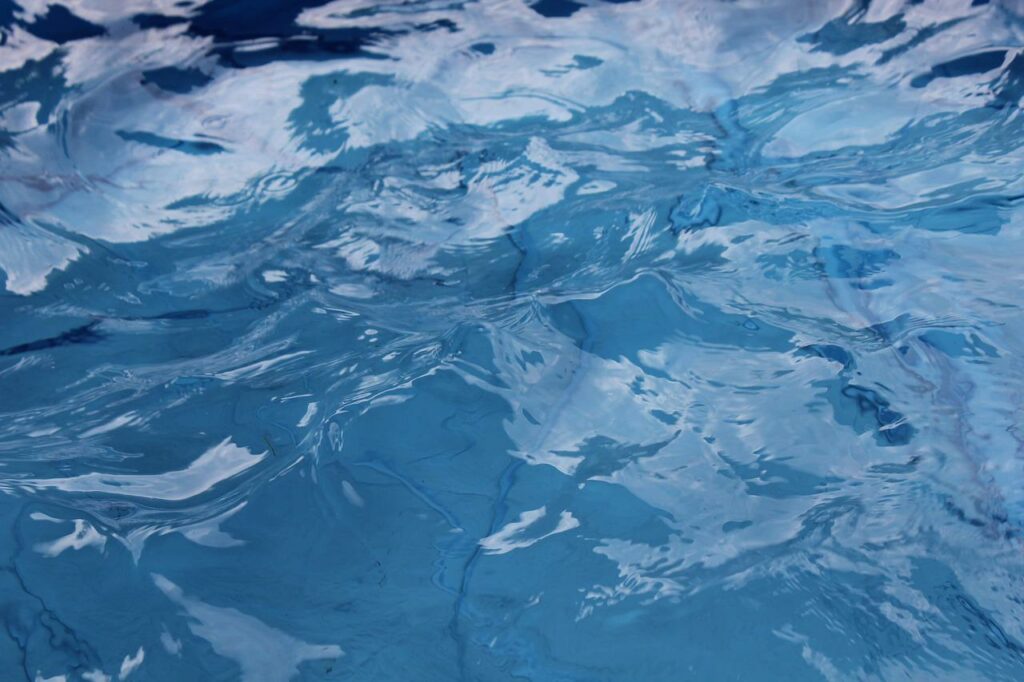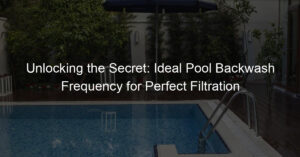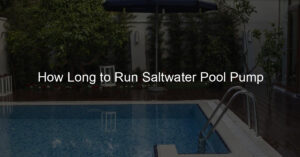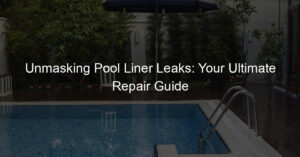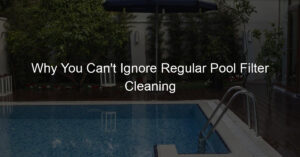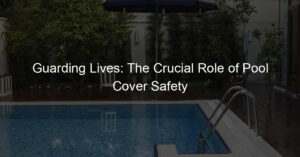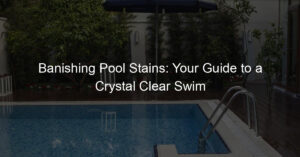Introduction
Has the question, “How often should I vacuum my pool?” been troubling you? Well, you are not alone! Pool maintenance, especially vacuuming, is a vital aspect of being a pool owner that often leaves many puzzled. However, fear not!
This comprehensive guide is here to provide you with a clear roadmap on how often you should vacuum your pool. This post will dive into numerous factors such as pool usage, weather conditions, seasonal considerations, algae blooms, and more, which significantly impact your pool vacuuming schedule.
You’ll also gain insight into how pool vacuuming impacts your health, the environment, and your pocket. Let’s take a plunge into these factors and find the best pool vacuuming schedule for you!
Understanding Your Pool’s Cleaning Needs: How Often to Vacuum
Every pool is unique, and its cleaning needs can vary greatly depending on several factors. Generally, it’s a good practice to vacuum your pool once a week. However, this could change depending on the usage, season, and presence of surrounding foliage. This guide will help you understand the specifics and tailor a vacuuming schedule that suits your pool’s needs.
Identifying Key Factors That Determine Your Pool Vacuuming Schedule
Multiple elements play a crucial role in determining the frequency of your pool vacuuming. These include pool usage, weather, season, surrounding environment, and pool type. A thorough understanding of these factors will allow you to make an informed decision on how often to vacuum your pool. This post will delve into each of these aspects in the following sections.
The Impact of Pool Usage on Vacuuming Frequency
The more frequently your pool is used, the more often it needs to be vacuumed. Sweat, oils, and other contaminants from swimmers can build up in the pool, affecting water quality and clarity. If your pool is heavily used, especially during the summer months, it might require vacuuming two or three times a week.
How Weather Conditions Affect How Often You Should Vacuum Your Pool
Weather conditions significantly impact the frequency of vacuuming. Windy conditions can blow dirt, leaves, and other debris into the pool, requiring more frequent vacuuming. Similarly, rain can also bring pollutants, which makes vacuuming necessary. If you live in an area with unpredictable weather, consider checking your pool after every major weather change.
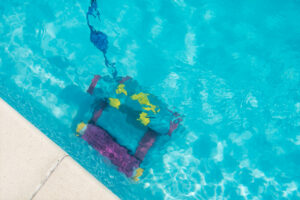
Seasonal Considerations for Pool Vacuuming: Summer vs. Winter
Your pool usage and vacuuming needs vary with the seasons. During summer, when pool usage is high, you may need to vacuum more frequently. However, in the winter months, especially if your pool is not in use, you can reduce the vacuuming frequency, depending on the amount of debris accumulation.
How Algae Blooms Influence Your Pool Vacuuming Routine
Algae blooms can quickly turn your pool water green if left unchecked. If you notice an algae bloom, you need to vacuum your pool immediately to prevent it from spreading. Regular vacuuming can also help prevent algae growth, as it removes the debris that algae feed on.
The Role of Trees and Foliage in Determining Pool Vacuuming Frequency
Pools surrounded by trees and plants tend to need more frequent vacuuming. Leaves, twigs, pollen, and other plant debris can fall into your pool, promoting algae growth and causing the water to become cloudy. If your pool is near trees or plants, consider vacuuming it twice a week or after every windy day.
Does Pool Size Affect How Often You Should Vacuum?
The size of your pool can indeed affect your vacuuming schedule. Larger pools may require more time and effort to vacuum completely but it doesn’t necessarily mean they need to be vacuumed more often. As long as the debris and dirt are kept under control, weekly vacuuming should suffice for pools of any size.
The Connection Between Pool Type and Vacuuming Necessity
The type of pool you have can influence the vacuuming frequency. Concrete pools can harbor algae more readily and might require more frequent vacuuming. On the other hand, vinyl or fiberglass pools may not need as much, provided the chemical balance is maintained.
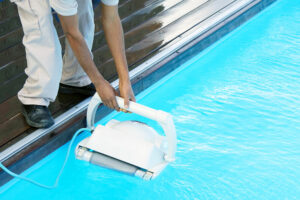
The Effect of Pool Filters on Your Vacuuming Schedule
Your pool’s filtration system plays a crucial role in maintaining water cleanliness. However, it can’t catch larger debris like leaves, bugs, and twigs, which is where vacuuming comes in.
If your filter system is highly effective and runs regularly, you might get by with less frequent vacuuming. But, remember that vacuuming is still necessary for a comprehensive cleaning.
Automatic vs. Manual Pool Vacuum: Frequency Differences
Whether you use a manual pool vacuum or an automatic one can also affect your cleaning schedule. Automatic vacuums can be set to run daily, keeping your pool clean with minimal effort. However, a manual vacuum once a week can give your pool a thorough clean, reaching areas that the automatic vacuum might miss.
Maintaining Proper Chemical Balance: Vacuuming’s Role
Regular vacuuming can help maintain the chemical balance in your pool. Organic matter and debris can consume chlorine, making your pool more susceptible to bacteria and algae. By vacuuming regularly, you remove these contaminants, ensuring your chemicals can work effectively.
Understanding the Health Risks of Not Vacuuming Your Pool Regularly
A dirty pool isn’t just unappealing; it’s also a health risk. Bacteria and algae can multiply in unclean water, potentially causing skin, ear, and eye infections. Regular vacuuming keeps the water clean, reducing the risk of swimming-related illnesses.
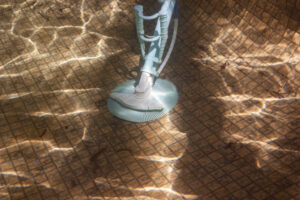
The Environmental Impact of Regular Pool Vacuuming
Regular pool vacuuming helps keep your pool water clean, reducing the need for excessive chemical use. This can lower the environmental impact of your pool, as fewer chemicals mean less risk of water pollution.
Cost-Benefit Analysis: Hiring a Pool Service vs. Regular DIY Vacuuming
While vacuuming your pool may seem like a tedious task, it can save you a significant amount of money in the long run. Hiring a pool service can be quite expensive compared to investing in a good pool vacuum and doing it yourself. Not only do you get to understand your pool better, but you also have full control over its cleanliness.
Table: Factors Influencing Pool Vacuuming Frequency
| Factor | Impact | Increase or Decrease Frequency | Notes |
|---|---|---|---|
| Usage | High usage leads to more contaminants | Increase | More frequent during summers |
| Weather | Wind and rain can bring debris | Increase | Vacuum after major weather changes |
| Season | Varies depending on pool usage | Increase in summer, decrease in winter | Adjust according to debris accumulation |
| Surrounding Foliage | Trees and plants can drop debris | Increase | Consider vacuuming after windy days |
Creating an Effective and Efficient Pool Vacuuming Schedule
An effective pool vacuuming schedule balances your pool’s needs with your available time. Regularly assess your pool’s condition, adjust your vacuuming schedule as necessary, and remember to increase the frequency during high usage periods and when weather conditions favor debris accumulation.
Pool Vacuuming Best Practices for Pool Longevity
Proper and regular vacuuming not only keeps your pool clean and safe to use but also extends its lifespan. It prevents staining, keeps the chemical balance intact, and reduces the wear on your pool’s components, giving you many more years of enjoyment.
The Relationship Between Pool Vacuuming and Water Clarity
Regular vacuuming significantly improves your pool’s water clarity. It removes fine particles that can make your water look cloudy, leaving it crystal clear and inviting. Remember, clear water is not always clean, so maintain your regular vacuuming schedule even if your pool looks clear.
Troubleshooting Common Issues with Pool Vacuuming
Despite regular vacuuming, you may still face some issues, such as persistent cloudiness, algae growth, or debris build-up. This section provides solutions to common pool vacuuming problems and gives you practical tips to maintain a sparkling clean pool.
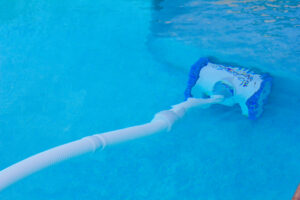
Conclusion
How often to vacuum your pool is a question that doesn’t have a one-size-fits-all answer. It depends on many factors, including pool usage, weather conditions, pool type, and more. This guide has given you the knowledge you need to determine the perfect vacuuming schedule for your pool.
Remember, regular vacuuming not only keeps your pool water clear and inviting but also ensures it’s safe to use and prolongs the lifespan of your pool. Regular assessment of your pool’s condition and adjusting your vacuuming routine accordingly is key to maintaining a healthy, sparkling pool.
Exploring Additional Factors
“Location’s Impact on Vacuuming Frequency”
Your geographical location might play a role in how often you should vacuum your pool. If you live in a desert area, for example, sand might frequently find its way into your pool. In this case, you might need to vacuum more often.
“Effect of Pool Parties on Vacuuming Schedule”
Pool parties mean more people, more fun, and unfortunately, more dirt and debris. If you often host pool parties, you might need to adjust your vacuuming schedule to maintain a clean and healthy pool.
“Swim Lessons and Pool Cleaning”
If your pool is being used for swim lessons, especially with children, the increase in pool use could necessitate more frequent vacuuming. Always ensure the pool is cleaned thoroughly after each session.
“Impact of Pets on Vacuuming Needs”
If your furry friends enjoy a dip now and then, you’ll likely need to vacuum your pool more frequently. Pet hair can quickly clog up filters and lead to a buildup of debris in the pool.

